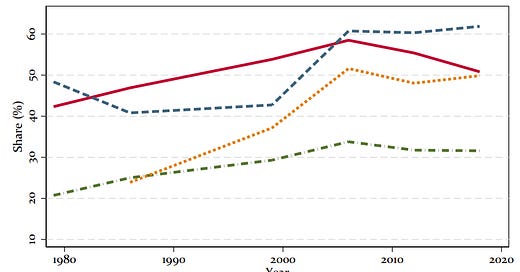I tend to say that now that I am working for a smaller company I may make less money, but much of the money I made in large companies were punitive damages anyway. I am fortunate to work at a company where there is little to no office politics and people have the freedom to work on a broad range of topics. This is in strong contrast to certain large companies I have worked for in the past where I was surrounded by a surprising number of incompetent but highly political people who defined their job as making sure their turf was not touched and no competitor would get anything done that could harm their own career prospects.
And I hate office politics so much that I am willing to give up a good chunk of my paycheck to not have to deal with these idiots.
Other people differ and are facing other stress factors in their jobs. The chart below shows the results of decades of surveys by the Federal Institute for Vocational Education and Training in Germany about stress factors people encounter in their jobs. Since the early 1980s, we have seen a significant increase in multitasking requirements and work interruptions that lead to stress.
Evolution of main work pressure variables in Germany
Source: Nagler et al. (2022)
But are we as employees and workers being compensated for this additional stress? Markus Nagler and his colleagues analysed the responses of the 8,000 German employees who responded to the 2018 survey shown above and found that jobs with higher pressure on average pay more. That is true even within narrowly defined occupations. If you have a job as a machine technician, a work environment with higher work pressures leads to higher wages than a work environment with lower pressures. The only area where this seems not to be the case is the civil service where the researchers couldn’t find a relationship between job pressure and financial compensation.
Then the researchers did something interesting. They wondered if people self-sort into high- and low-pressure jobs, i.e. if you don’t like to have a lot of pressure at work, you may choose to leave such jobs and take a job in a calmer, less stressful environment. Similarly, if you like to deal with deadlines and other pressures at work, you may seek out such jobs. And if you like to play political games you may choose to work for large financial institutions…
So, they ran a series of experiments with over 3,300 German employees to find out how much of their salary they would be willing to sacrifice to get rid of certain job stressors. The chart below shows some of the main results. They found indeed that people who are working in stressful jobs would give up less of their salaries to avoid stress factors on average, indicating that people do self-sort into jobs that fit their personal preferences for stress and pressure (or lack thereof).
But in general, people are willing to give up quite a bit of their salary to avoid certain stressors. For example, reducing deadline pressures or multitasking pressures is worth about 5-10% of the salary.
Workers’ willingness to pay (WTP) to avoid work pressure
Source: Nagler et al. (2022)
Meanwhile, the real winners seem to be additional vacation days and shorter commutes to work. People on average are willing to give up some 12% of their salary to increase their annual vacation allowance by five days (from an already high German standard of 25 days). And they are willing to give up more than 20% of their salary to reduce their commuting time from 60 minutes to 15 minutes.
And the last two are things that I personally have a hard time understanding. I, like many people who live in major cities like London or New York, have a commute of more than one hour in each direction, because that is normal. And I am struggling to take the 25 days of vacation I have each year anyway. I wouldn’t know what to do with five or ten days extra.
But as this study shows, this is why I live in London and have the job I have. I don’t mind spending two hours each day commuting. And I don’t need more than 25 days of vacation each year.
Most people are different, and they live in places where their commute is shorter or work for companies that provide more generous vacation allowances. It is a matter of preference and neither way of life is better than the other. Except that working in an environment with lots of office politics remains absolute misery except for ignorant bullies and manipulative narcissists…






Every successful leader builds a kingdom. The question is whether you use your kingdom for good (production) or evil (personal gratification through the exercise of power).
I didn't mind commuting when I was younger. I look back on it as a huge waste now.